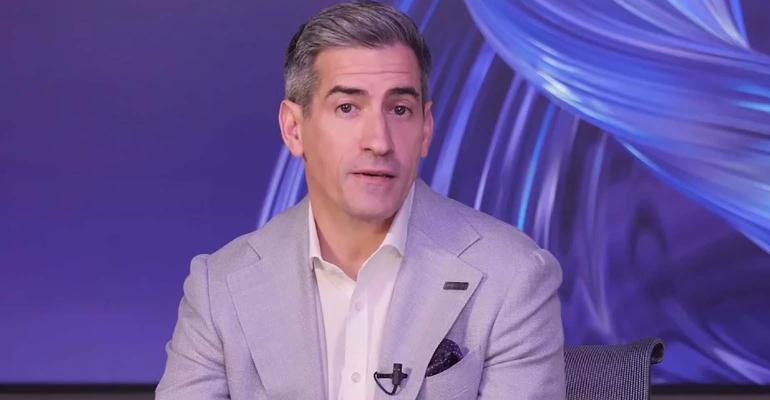(Bloomberg) -- The S&P 500 is off to a great start this year. Meme stocks are rip-roaring. Crypto is busting higher. Does that mean it’s time to take on more risk? One Wall Street veteran, who’s sticking with a resolutely defensive stance, says not so fast.
Keith Lerner, co-chief investment officer at Truist Wealth, joins this week’s “What Goes Up” podcast to talk about what he sees on the horizon.
Here are some highlights of the conversation, which have been condensed and lightly edited for clarity. Click here to listen to the full podcast on the Terminal, or subscribe below on Apple Podcasts, Spotify or wherever you listen.
Listen to What Goes Up on Apple Podcasts
Listen to What Goes Up on Spotify
Q: What’s behind this resurgence in meme stocks, crypto, etc.?
A: If you think about late last year, we saw actually a lot of tax-loss selling, we saw the S&P have this correction in December, around 5% or 6%. So as you turn the calendar, a lot of these areas that were beat up, that were sold off late last year are seeing this mean reversion. And January is often the time when you see that mean reversion. But if you think about the meme stocks, those typically will do well in a period of rising liquidity, and we’re still taking away liquidity. So we just don’t think it’s sustainable. We think it’s more of a bounce, but we would be fading that bounce.
Q: You say investors should remain defensive. Walk us through what that means in this environment.
A: We moved to an underweight position in equities at the end of October, and we went to an overweight position in fixed income. And as we’re thinking about big-picture asset allocation, we think that the macro risks are large, we think there’s still somewhat elevated recession risk. And we look at equities and credit, and we just don’t think you’re being compensated. At best you could say with the correction we had last year, equities are maybe fairly valued. Credit markets are actually, to us, very expensive relative to the risk. So being defensive from a stock, bonds and cash perspective is being overweight fixed income relative to equities. And then in the fixed-income component, keeping it simple — keeping it with high-quality fixed income and not really taking a lot of credit risk at this point. And then moving down a little bit, when we think about the overall markets, you also have to go below the market’s surface. Tech is still not leadership. So we’ve been seeing more opportunities below the market’s surface — things like the equal-weighted S&P. And then lastly, more from a sector standpoint, barbell and defensive sectors like health care with things like energy and industrials that have some unique circumstances in this environment.
Q: You’re also projecting a US recession — tell us about that.
A: We all know if we do have a recession, it’ll be the most-called one beforehand in history. But we follow the weight of the evidence and we look at some timely indicators, and those indicators — whether it’s the deep inversion of the yield curve, the leading economic indicators, which are down more than 4% on a year-over-year basis, the housing market, which peaked last year — those historically suggest elevated recession risk. But as we look even at the yield curve, on average once you invert, which happened last year, that would push us more into the middle to the fall of this year. So as far as the recession, I would say right now the data suggests we are not in recession, but we still think there’s risk of one happening later this year. And the biggest reason behind that is, as we all know, we’ve had the most aggressive increase in monetary policy, not only domestically, but also globally, in the last 40 years, and we just think that’s going to weigh on growth as we move further into this year.
Q: One theme we keep hearing is the outperformance of the rest of the world versus the US. Walk us through what makes you want to stay away from international.
A: A little context: We’ve been big bulls on the US for several years, fortunately have benefited from the big outperformance. Because we’ve been thinking the US is that big blue-chip country. And if you look at just simply the earning trends for the US, they have been so much stronger than the rest of the globe. However, even for our position on a shorter-term basis, international markets have done really well. And if you think about why that is, there’s two main factors. One, the climate in Europe was much warmer than expected. So, the energy crisis that a lot of folks were concerned about just didn’t happen. And then the second positive, which was unexpected, was basically China ripping the bandaid off of Covid. And Europe’s a big trading partner.
So, with all that said, that’s an area we’re focusing on right now. On a short-term basis, if you look at the last two or three months, it’s had one of the biggest outperformance periods in the last 20 or 30 years. So, our position is things are getting more interesting there, you’ve had a big run because of these unexpected events that have broken the right way. We would be looking more potentially to upgrade that on a consolidation or a pullback after such a strong move up that we’ve seen.
--With assistance from Dashiell Bennett and Stacey Wong.





